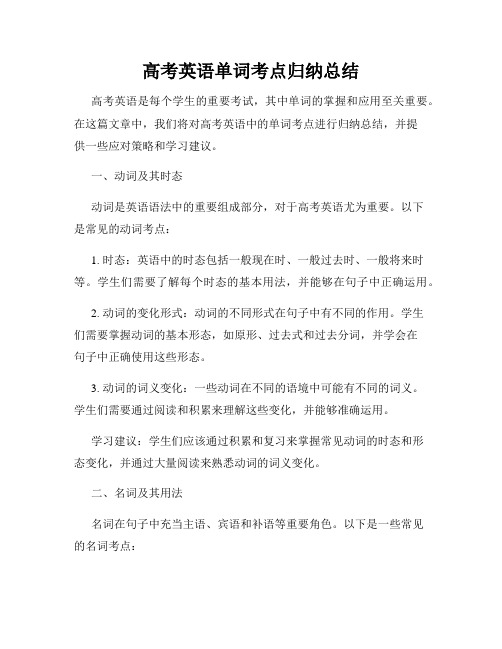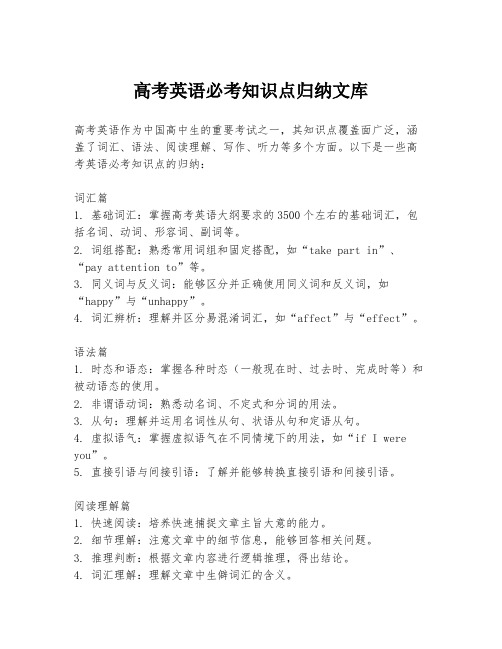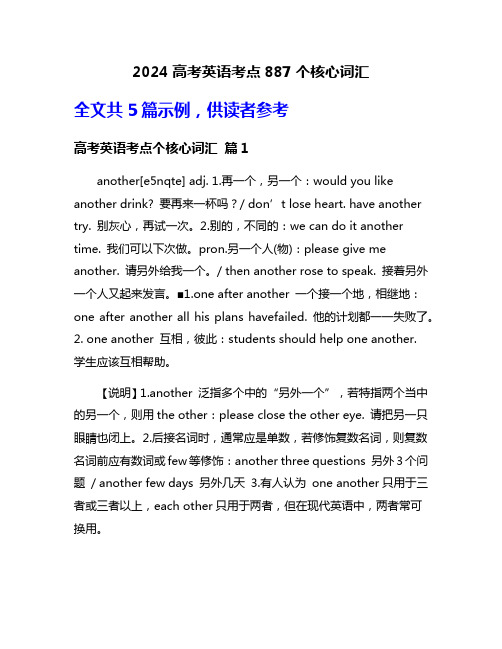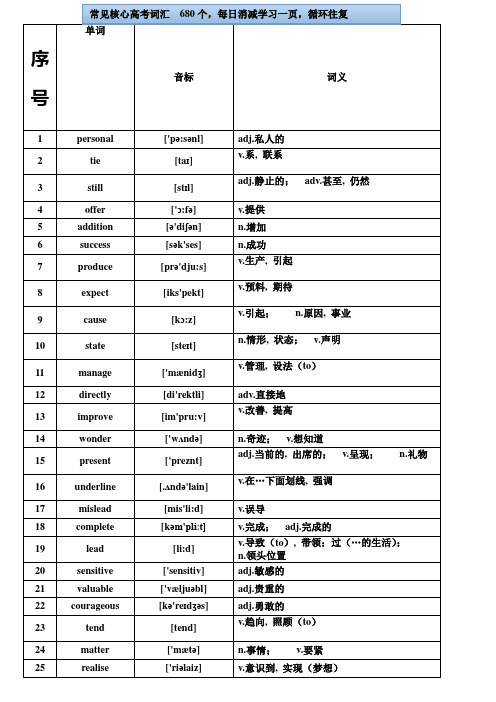英语高考英语常用词汇考点知识归纳
高考英语单词考点归纳总结

高考英语单词考点归纳总结高考英语是每个学生的重要考试,其中单词的掌握和应用至关重要。
在这篇文章中,我们将对高考英语中的单词考点进行归纳总结,并提供一些应对策略和学习建议。
一、动词及其时态动词是英语语法中的重要组成部分,对于高考英语尤为重要。
以下是常见的动词考点:1. 时态:英语中的时态包括一般现在时、一般过去时、一般将来时等。
学生们需要了解每个时态的基本用法,并能够在句子中正确运用。
2. 动词的变化形式:动词的不同形式在句子中有不同的作用。
学生们需要掌握动词的基本形态,如原形、过去式和过去分词,并学会在句子中正确使用这些形态。
3. 动词的词义变化:一些动词在不同的语境中可能有不同的词义。
学生们需要通过阅读和积累来理解这些变化,并能够准确运用。
学习建议:学生们应该通过积累和复习来掌握常见动词的时态和形态变化,并通过大量阅读来熟悉动词的词义变化。
二、名词及其用法名词在句子中充当主语、宾语和补语等重要角色。
以下是一些常见的名词考点:1. 单数和复数形式:一些名词的复数形式不规则,学生们需要记住这些不规则变化,并能够准确使用它们。
2. 可数名词和不可数名词:英语中有些名词可以数,有些名词不能数。
学生们需要了解哪些名词属于可数名词,哪些属于不可数名词,并在句子中正确使用。
3. 名词的所有格形式:名词所有格表示所属关系,学生们需要掌握不同名词所有格的形式和用法,并在句子中正确运用。
学习建议:学生们应该通过阅读和实际运用来加深对名词的理解,同时积累常见名词的复数形式和所有格形式。
三、形容词及副词的用法形容词和副词是修饰名词和动词的重要词类。
以下是一些常见的形容词和副词考点:1. 形容词的比较级和最高级:形容词可以用比较级和最高级来进行比较。
学生们需要了解这些形式的构成规则,并能够在句子中正确运用。
2. 副词的修饰范围:副词可以修饰动词、形容词和其他副词。
学生们需要了解不同类型的副词在句子中的位置和用法。
3. 形容词和副词的词义变化:一些形容词和副词在不同的语境中可能有不同的词义。
高考英语必考知识点归纳文库

高考英语必考知识点归纳文库高考英语作为中国高中生的重要考试之一,其知识点覆盖面广泛,涵盖了词汇、语法、阅读理解、写作、听力等多个方面。
以下是一些高考英语必考知识点的归纳:词汇篇1. 基础词汇:掌握高考英语大纲要求的3500个左右的基础词汇,包括名词、动词、形容词、副词等。
2. 词组搭配:熟悉常用词组和固定搭配,如“take part in”、“pay attention to”等。
3. 同义词与反义词:能够区分并正确使用同义词和反义词,如“happy”与“unhappy”。
4. 词汇辨析:理解并区分易混淆词汇,如“affect”与“effect”。
语法篇1. 时态和语态:掌握各种时态(一般现在时、过去时、完成时等)和被动语态的使用。
2. 非谓语动词:熟悉动名词、不定式和分词的用法。
3. 从句:理解并运用名词性从句、状语从句和定语从句。
4. 虚拟语气:掌握虚拟语气在不同情境下的用法,如“if I were you”。
5. 直接引语与间接引语:了解并能够转换直接引语和间接引语。
阅读理解篇1. 快速阅读:培养快速捕捉文章主旨大意的能力。
2. 细节理解:注意文章中的细节信息,能够回答相关问题。
3. 推理判断:根据文章内容进行逻辑推理,得出结论。
4. 词汇理解:理解文章中生僻词汇的含义。
写作篇1. 应用文写作:掌握书信、通知、邀请函等应用文的写作格式和技巧。
2. 议论文写作:能够就某一话题展开论述,提出观点并给出支持论据。
3. 描述文写作:描述事物、场景或人物,使用恰当的形容词和副词。
4. 图表作文:根据图表信息,进行数据的描述和分析。
听力篇1. 对话理解:理解日常对话中的信息,如购物、问路等。
2. 短文理解:听懂短文的主旨大意和细节信息。
3. 听力填空:根据听到的内容填写空缺的单词或短语。
4. 听力选择题:根据听到的内容选择正确答案。
综合运用能力1. 完形填空:在理解文章大意的基础上,选择合适词汇填空。
2024高考英语考点887个核心词汇

2024高考英语考点887个核心词汇全文共5篇示例,供读者参考高考英语考点个核心词汇篇1another[e5nqte] adj. 1.再一个,另一个:would you like another drink? 要再来一杯吗?/ don’t lose heart. have another try. 别灰心,再试一次。
2.别的,不同的:we can do it another time. 我们可以下次做。
pron.另一个人(物):please give me another. 请另外给我一个。
/ then another rose to speak. 接着另外一个人又起来发言。
■1.on e after another 一个接一个地,相继地:one after another all his plans havefailed. 他的计划都一一失败了。
2. one another 互相,彼此:students should help one another.学生应该互相帮助。
【说明】1.another 泛指多个中的“另外一个”,若特指两个当中的另一个,则用the other:please close the other eye. 请把另一只眼睛也闭上。
2.后接名词时,通常应是单数,若修饰复数名词,则复数名词前应有数词或few等修饰:another three questions 另外3个问题/ another few days 另外几天3.有人认为one another只用于三者或三者以上,each other只用于两者,但在现代英语中,两者常可换用。
answer[5b:nse] n.[c]1.回答,回信:have you had an answerto your letter? 你那封信有回音了没有?2.(以行动)回应:i rang the bell but there was no answer. 我按了门铃,但没有人来开门。
高考常见英语词汇知识点

高考常见英语词汇知识点在高中英语学习的过程中,我们经常遇到各种各样的英语单词。
这些单词在高考中占据着重要地位,因此掌握常见的英语词汇知识点对于高考备考非常重要。
在本文中,我们将讨论一些常见的高考英语词汇知识点。
1. 动词时态和语态在高考英语考试中,动词时态和语态是考查的重要内容。
常见的动词时态有一般现在时、一般过去时、现在进行时、现在完成时、过去进行时、过去完成时等。
例如,在高考中常见的句子“Jim is playing basketball with his friends”中,“is playing”是现在进行时。
此外,语态也是高考常见的考点,常见的语态有被动语态和完成被动语态。
例如,“The cake was eaten by the children”中,“was eaten”是被动语态。
2. 名词复数形式名词的复数形式也是高考的重要考点之一。
英语名词复数的构成有很多规则,例如一般加“s”,以辅音字母+y结尾的词变“y”为“i”,再加“es”等。
例如,单数形式的词“book”变为复数形式的词“books”。
掌握名词的复数形式对于理解和表达复数概念非常重要。
3. 介词用法介词在英语中起着非常重要的作用。
常见的介词有in、on、at、of、to等。
它们用来表示时间、地点、方向、原因等。
例如,“I am going to the park”中,“to”表示方向。
在高考英语考试中,要能准确地理解和使用不同的介词,避免使用错误的介词。
4. 形容词与副词的比较级和最高级形容词和副词的比较级和最高级也是高考常见的考点之一。
形容词的比较级和最高级通常通过在词尾加“er”和“est”来构成。
副词的比较级和最高级通常在副词前加“more”和“most”。
例如,形容词“tall”的比较级和最高级分别是“taller”和“tallest”。
熟练掌握形容词和副词的比较级和最高级是高考英语考试中的一个重要技巧。
5. 连词的用法连词在英语中用来连接短语、从句或句子。
高考英语必考知识点总结归纳

高考英语必考知识点总结归纳一、词义辨析1. Homonyms(同音异义词)同一发音,不同的意思和拼写。
例如:right(正确)和write(写作)2. Homophones(同音词)同一发音,不同的拼写和意思。
例如:there(那里)、their(他们的)和they're(他们是)3. Synonyms(同义词)相同意义或者相同概念的词语。
例如:happy(快乐)和joyful(快乐的)4. Antonyms(反义词)相反意义的词语。
例如:hot(热)和cold(冷)二、语法知识点1. 时态英语时态共分为12个时态,包括一般现在时、一般过去时、一般将来时等。
熟练掌握各个时态的用法和构成规则。
2. 从句主从复合句是英语中比较复杂的句式之一。
了解并掌握宾语从句、定语从句和状语从句的用法和连接词。
3. 被动语态被动语态是英语中常见的语态之一。
了解被动语态的构成和用法,并能够正确转化主动句为被动句。
4. 倒装句倒装句是英语中句子结构的一种特殊形式,主语和谓语的位置颠倒。
掌握各类倒装句的用法和构成规则。
三、词法知识点1. 词汇拓展熟悉常见词根、前缀和后缀的含义和用法,能够通过词根拓展词汇,提高词汇应用能力。
2. 短语辨析辨别常见短语的意思和用法,例如 look forward to(期待)、get along with(与...相处)等。
四、阅读理解1. 主旨大意阅读文章,并能够准确理解文章的主旨大意,抓住重点信息。
2. 推理判断根据文章内容,进行推理判断,了解文章的隐含意思。
3. 词汇猜测在阅读过程中,根据上下文和词根、前缀、后缀等进行词汇猜测,理解不认识的词语。
五、写作技巧1. 作文结构了解作文的基本结构,包括开头、主体和结尾,并能够根据不同题目灵活运用。
2. 句式多样性丰富句子结构,运用不同的句式,提高作文的语言表达能力。
3. 谚语和俚语熟悉一些常用的谚语和俚语,并能够根据题目适当运用,提高作文的语言灵活性。
高考英语常用核心高频词汇680个

v.尊敬, 尊重; n.尊敬, 尊重
v.使失望 v.简化, 使简单
v.举起, 筹集, 提出
v.涉及, 提到;查阅(to)
n.成就 adj.特别的 v.阻止 adj.有规律的, 定期的
v.连接, 联系(with)
60
connect
61
subject
62
physical
63
check
64
position
65
concern
66
force
67
satisfy
68
organize
69
charge
70
favor
71
damage
72
publish
73
focus
74
affect
[ri'spekt] [disə'pɔint] ['simplifai]
n.焦点; v.影响
v.聚焦(on)
常见核心高考词汇 680 个,每日消减学习一页,循环往复 单词
序
音标
词义
号
75
feed
76
weigh
77
pressure
78
credit
79
visible
80
operate
81
warn
82
relate
83
strength
84
stress
85
attack
86
determine
高考英语必备高频考点整理

1.接不定式而不接动名词作宾语的24个常用动词afford to do sth. 负担得起做某事agree to do sth. 同意做某事arrange to do sth.安排做某事ask to do sth. 要求做某事beg to do sth. 请求做某事care to do sth. 想要做某事choose to do sth. 决定做某事decide to do sth. 决定做某事demand to do sth. 要求做某事determine to do sth. 决心做某事expect to do sth. 期待做某事fear to do sth. 害怕做某事help to do sth. 帮助做某事hope to do sth. 希望做某事learn to do sth. 学习做某事manage to do sth. 设法做某事offer to do sth. 主动提出做某事plan to do sth. 计划做某事prepare to do sth. 准备做某事pretend to do sth. 假装做某事promise to do sth. 答应做某事refuse to do sth. 拒绝做某事want to do sth. 想要做某事wish to do sth. 希望做某事注:有些不及物动词后习惯上也接不定式,不接动名词:aim to do sth. 打算做某事fail to do sth. 未能做某事long to do sth. 渴望做某事happen to do sth. 碰巧做某事hesitate to do sth. 犹豫做某事struggle to do sth. 努力做某事2.接不定式作宾补的36个常用动词advise sb. to do sth. 建议某人做某事allow sb. to do sth. 允许某人做某事ask sb. to do sth.请叫某人做某事bear sb. to do sth.忍受某人做某事beg sb. to do sth. 请求某人做某事cause sb. to do sth. 导致某人做某事command sb. to do sth. 命令某人做某事drive sb. to do sth. 驱使某人做某事elect sb. to do sth. 选举某人做某事encourage sb. to do sth. 鼓励某人做某事expect sb. to do sth. 期望某人做某事force sb. to do sth. 强迫某人做某事get sb. to do sth. 使要某人做某事hate sb. to do sth. 讨厌某人做某事help sb. to do sth. 帮助某人做某事intend sb. to do sth. 打算要某人做某事invite sb. to do sth. 邀请某人做某事leave sb. to do sth. 留下某人做某事like sb. to do sth. 喜欢某人做某事mean sb. to do sth. 打算要某人做某事need sb. to do sth. 需要某人做某事oblige sb. to do sth. 迫使某人做某事order sb. to do sth. 命令某人做某事permit sb. to do sth. 允许某人做某事persuade sb. to do sth. 说服某人做某事prefer sb. to do sth. 宁愿某人做某事request sb. to do sth. 要求某人做某事remind sb. to do sth. 提醒某人做某事teach sb. to do sth. 教某人做某事tell sb. to do sth. 告诉某人做某事train sb. to do sth. 训练某人做某事trouble sb. to do sth. 麻烦某人做某事warn sb. to do sth. 警告某人做某事wish sb. to do sth. 希望某人做某事注意:不要受汉语意思的影响而误用以下动词句型:汉语说:“害怕某人做某事”,但英语不说fear sb. to do sth.;汉语说:“原谅某人做某事”,但英语不说excuse forgive sb. to do sth.;汉语说:“拒绝某人做某事”,但英语不说refuse sb. to do sth.;汉语说:“惩罚某人做某事”,但英语不说punish sb. to do sth.;汉语说:“建议某人做某事”,但英语不说suggest propose sb. to do sth.;汉语说:“赞成某人做某事”,但英语不说approve sb. to do sth.;汉语说:“通知某人做某事”,但英语不说inform sb. to do sth.;汉语说:“欢迎某人做某事”,但英语不说welcome sb. to do sth.;汉语说:“坚持某人做某事”,但英语不说insist persist sb. to do sth.; 汉语说:“希望某人做某事”,但英语不说hope sb. to do sth.;汉语说:“安排某人做某事”,但英语不说arrange sb. to do sth.;汉语说:“要求某人做某事”,但英语不说demand sb. to do sth.;汉语说:“感谢某人做某事”,但英语不说thank sb. to do sth.;汉语说:“祝贺某人做某事”,但英语不说congratulate sb. to do sth.; 汉语说:“阻止某人做某事”,但英语不说prevent sb. to do sth.;要表示以上意思,可换用其他表达:汉语的“原谅某人做某事”,英语可说成excuse forgive sb. for doing sth.;汉语的“希望某人做某事”,英语可说成wish sb. to do sth.;汉语的“建议某人做某事”,英语可说成advise sb. to do sth.;汉语的“安排某人做某事”,英语可说成arrange for sb. to do sth.; 汉语的“要求某人做某事”,英语可说成demand of sb. to do sth.; 汉语的“感谢某人做某事”,英语可说成thank sb. for doing sth.;汉语的“祝贺某人做某事”,英语可说成congratulate sb. on sth.;汉语的“阻止某人做某事”,英语可说成prevent sb. from doing sth.;3.接动名词不接不定式作宾语的34个常用动词admit doing sth. 承认做某事advise doing sth. 建议做某事allow doing sth. 允许做某事appreciate doing sth. 感激做某事avoid doing sth. 避免做某事consider doing sth. 考虑做某事delay doing sth. 推迟做某事deny doing sth. 否认做某事discuss doing sth. 讨论做某事dislike doing sth. 不喜欢做某事enjoy doing sth. 喜爱做某事escape doing sth. 逃脱做某事excuse doing sth. 原谅做某事fancy doing sth. 想要做某事finish doing sth. 完成做某事forbid doing sth. 禁止做某事forgive doing sth. 原谅做某事give up doing sth. 放弃做某事imagine doing sth. 想象做某事keep doing sth. 保持做某事mention doing sth. 提及做某事mind doing sth. 介意做某事miss doing sth. 错过做某事pardon doing sth. 原谅做某事permit doing sth. 允许做某事practice doing sth. 练习做某事prevent doing sth. 阻止做某事prohibit doing sth. 禁止做某事put off doing sth. 推迟做某事report doing sth. 报告做某事risk doing sth. 冒险做某事stop doing sth. 停止做某事suggest doing sth. 建议做某事understand doing sth. 理解做某事4.接现在分词作宾补的20个常用动词bring sb. doing sth.引起某人做某事catch sb. doing sth. 碰上撞上某人做某事discover sb. doing sth. 发现某人做某事feel sb. doing sth. 感觉某人做某事find sb. doing sth. 碰上撞上某人做某事get sb. doing sth. 使某人做某事have sb. doing sth. 使某人做某事hear sb. doing sth. 听见某人做某事keep sb. doing sth. 使某人不停地做某事listen to sb. doing sth. 听某人做某事look at sb. doing sth. 看着某人做某事notice sb. doing sth. 注意到某人做某事observe sb. doing sth. 观察某人做某事prevent sb. doing sth. 阻止某人做某事see sb. doing sth. 看见某人做某事send sb. doing sth.使某人突然做某事set sb. doing sth. 使引起某人做某事start sb. doing sth. 使某人开始做某事stop sb. doing sth. 阻止某人做某事watch sb. doing sth. 观察某人做某事5.接动词原形作宾补的11个常用动词feel sb. do sth. 感觉某人做某事have sb. do sth. 使某人做某事hear sb. do sth. 听见某人做某事let sb. do sth.让某人做某事listen to sb. do sth. 听着某人做某事look at sb. do sth. 看着某人做某事make sb. do sth. 使某人做某事notice sb. do sth. 注意某人做某事observe sb. do sth. 观察某人做某事see sb. do sth. 看见某人做某事watch sb. do sth. 观察某人做某事6.接不定式或动名词作宾语意思相同的12个动词like to do sth / like doing sth. 喜欢做某事love to do sth / love doing sth. 喜欢做某事hate to do sth / hate doing sth. 憎恨做某事prefer to do sth / prefer doing sth. 宁可做某事begin to do sth / begin doing sth. 开始做某事start to do sth / start doing sth. 开始做某事continue to do sth / continue doing sth. 继续做某事can’t bear to do sth / can’t bear doing sth. 不能忍受做某事bother to do sth / bother doing sth. 麻烦做某事intend to do sth / intend doing sth.想要做某事attempt to do sth / attempt doing sth. 试图做某事cease to do sth / cease doing sth. 停止做某事7.接不定式或动名词作宾语意思不同的7个动词1 remember to do sth. 记住要做某事remember doing sth. 记住曾做过某事2 forget to do sth. 忘记要做某事forget doing sth. 忘记曾做过某事3 regret to do sth. 后悔遗憾要做某事regret doing sth. 后悔遗憾曾做过某事4 try to do sth. 设法要做某事try doing sth. 做某事试试看有何效果5 mean to do sth. 打算做某事mean doing sth. 意味着做某事6 can’t help to do sth. 不能帮助做某事can’t help doing sth. 禁不住做某事7 go on to do sth. 做完某事后接着做另一事go on doing sth. 继续做一直在做的事注意:stop to do sth. 与stop doing sth.也不同,前者指停下来去做某事,后者指停止正在做的事,但stop to do sth. 中的不定式不是宾语,是目的状语;8.可接双宾语的38个常用动词1 双宾语易位时需借助介词to的常用动词award sb. sth. = award sth. to sb. 颁奖给某人bring sb. sth. = bring sth. to sb. 把某物带给某人hand sb. sth. =hand sth. to sb. 把某物递给某人lend sb. sth. = lend sth. to sb. 把某物借给某人mail sb. sth. = mail sth. to sb. 把某物寄给某人offer sb. sth. = offer sth. to sb. 将某物给某人owe sb. sth. = owe sth. to sb. 把……归功于某人;欠某人某物pass sb. sth. = pass sth. to sb. 把某物递给某人pay sb. sth. = pay sth. to sb. 付给某人某物钱post sb. sth. = post sth. to sb. 把某物寄给某人read sb. sth. = read sth. to sb. 把某物读给某人听return sb. sth. = return sth. to sb. 把某物还给某人send sb. sth. = send sth. to sb. 把某物送给某人sell sb. sth. = sell sth. to sb. 把某物卖给某人serve sb. sth. = serve sth. to sb. 拿某物招待某人show sb. sth. = show sth. to sb. 拿某物给某人看take sb. sth. = take sth. to sb. 把某物拿给某人teach sb. sth. = teach sth. to sb. 教某人某物tell sb. sth. = tell sth. to sb. 告诉某人某情况throw sb. sth. = throw sth. to sb. 把某物扔给某人write sb. sth. = write sth. to sb. 给某人写信2 双宾语易位时需借助介词for的常用动词book sb. sth. = book sth. for sb. 为某人预定某物buy sb. sth. = buy sth. for sb. 为某人买某物choose sb. sth. = choose sth. for sb. 为某人选某物cook sb. sth. = cook sth. for sb. 为某人煮某物draw sb. sth. = draw sth. for sb. 为某人画某物fetch sb. sth. = fetch sth. for sb. 为某人去取某物find sb. sth. = find sth. for sb. 为某人找到某物fix sb. sth. = fix sth. for sb. 为某人准备某物get sb. sth. = get sth. for sb. 为某人拿来某物make sb. sth. = make sth. for sb. 为某人做某物order sb. sth. = order sth. for sb. 为某人订购某物pick sb. sth. = pick sth. for sb. 为某人采摘某物prepare sb. sth. = prepare sth. for sb. 为某人准备某物save sb. sth. = save sth. for sb. 为某人留某物sing sb. sth. = sing sth. for sb. 为某人唱某物歌spare sb. sth. = spare sth. for sb. 为某人让出某物steal sb. sth. = steal sth. for sb. 为某人偷某物注意:有的动词后接的双宾语易位时,既可用介词to引出间接宾语,也可用介词for引出间接宾语,含义相同,如bring,play等:Bring me today’s paper. = Bring today’s paper to for me. 把今天的报纸拿给我;He played us the record he had just bought. = He played the record he had just bought for to us. 他放了他刚买的唱片给我们听;有的动词后接的双宾语易位时,既可用介词to引出间接宾语,也可用介词for引出间接宾语,含义不同,如leave等:They left me no food. = They left no food for me. 他们没给我留一点食物;My uncle left me a large fortune. = My uncle left a large fortune to me.我叔叔死后留下一大笔财产给我;而有的动词后接双宾语时,既不能用介词to引出间接宾语,也不能用介词for引出间接宾语,如allow, ask, cause, charge, cost, forgive, refuse等:He allows his son too much money. 他给他儿子的钱太多;He asked me some questions. 他问了我一些问题;This caused me much trouble. 这给我带来了许多麻烦;He charged me five dollars for a cup of tea. 他一杯茶向我要了5美元;His mistake cost him his job. 他的错误让他丢了工作;I envy you your good luck. 我羡慕你的好运;They forgave him his rudeness. 他们原谅了他的鲁莽;He refused her nothing. 她要什么他就给什么;9.可用于“动词+sb+of sth”的8个常见动词accuse sb. of sth. 控告某人犯某事罪,指责某人做某事cheat sb. of sth. 骗取某人某物cure sb. of sth. 治好某人的病,改掉某人的坏习惯inform sb. of sth. 通知某人某情况事remind sb. of sth. 使某人想起某情况事rid sb. of sth. 使某人摆脱某物rob sb. of sth. 抢劫某人的某东西warn sb. of sth. 警告某人有某情况10.可用于“动词+sb+for doing sth”的8个常见动词blame sb. for doing sth. 指责某人做某事criticize sb. for doing sth. 批评某人做某事forgive sb. for doing sth. 原谅某人做某事excuse sb. for doing sth. 原谅某人做某事pardon sb. for doing sth. 原谅某人做某事punish sb. for doing sth. 惩罚某人做某事scold sb. for doing sth. 指责责备某人做某事thank sb. for doing sth. 感谢某人做某事11.可用于“动词+sb+into doing sth”的9个常见动词cheat sb. into doing sth. 欺骗某人做某事trick sb. into doing sth. 欺骗某人做某事fool sb. into doing sth. 欺骗某人做某事force sb. into doing sth. 迫使某人做某事argue sb. into doing sth. 说服某人做某事talk sb. into doing sth. 说服某人做某事terrify sb. into doing sth. 威胁某人做某事frighten sb. into doing sth. 吓唬某人做某事persuade sb. into doing sth. 说服某人做某事12.容易误用作及物动词的9个不及物动词误:deal a problem正:deal with a problem 处理问题误:depend sb.正:depend on sb. 依靠依赖某人误:insist doing sth.正:insist on doing sth. 坚持要做某事误:knock the door正:knock on at the door 敲门误:operate sb.正:operate on sb. 为某人做手术误:participate sth.正:participate in sth. 参加某事误:refer sth.正:refer to sth. 查阅参考某物误:rely sb. / sth.正:rely on sb. / sth. 依靠依赖某人某物误:reply a letter正:reply to a letter 回信注意:在某些其他用法中,以上有的动词也可能及物,如insist, reply 等动词后可接宾语从句,operate表示“操作”、“管理”等时则及物;13.容易误用作不及物动词的8个及物动词误:serve for sb.正:serve sb. 为某人服务误:marry with sb.正:marry sb. 与某人结婚误:discuss about sth.正:discuss sth. 讨论某事误:mention about sth.正:mention sth. 提到某事误:enter into a room正:enter a room 进入房间误:contact with sb.正:contact sb. 与某人联系误:equal to sth.正:equal sth. 等于某物误:ring to sb.正:ring sb. 给某人打注意:有个别词在用于其他意义时,可以是不及物的,如enter into可以表示开始进入或从事某一状态或活动,或用于较抽象的概念;如:The country entered into a state of war. 这个国家进入战争状态;I can enter into your feelings at the loss of your father. 我理解你失去父亲后的心情;The two old men entered into a long conversation. 两位老人开始长谈起来;14. 17个常用“be+形容词+about”结构be angry about 为……生气be anxious about 为……担忧be careful about 当心……be certain about 确信……be curious about 对……好奇be disappointed about 对……失望be excited about 对……感到兴奋be glad about 对……感到高兴be happy about 为……感到高兴be hopeful about 对……抱有希望be mad about 对……入迷be nervous about 为……感到不安be particular about 对……讲究be sad about 为……而难过be serious about 对……认真be sure about 对……有把握be worried about 为……担忧15. 10个常用“be+形容词+at”结构be angry at 为……生气be bad at 不善于……be clever at 擅长于……be disappointed at 对……失望be expert at 在……方面是内行be good at 善于……be mad at 对……发怒be quick at 在……方面敏捷be skilful at 在……方面熟练be slow at 在……方面迟钝16. 18个常用“be+形容词+for”结构be anxious for 渴望be bad for 对……有害,对……不利be bound for 前往be celebrated for 以……出名be convenient for 对……方便,在……附近be eager for渴望be famous for 因……闻名be fit for 合适,适合be good for 对……有益方便be grateful for 感谢be hungry for 渴望得到be late for 迟到be necessary for 对……有必要be ready for 为……准备好be sorry for 因……抱歉be suitable for 对……合适适宜be thankful for 因……而感激be well-known for以……出名17. 6个常用“be+形容词+from”结构be absent from 缺席,不在be different from 与……不同be far from 离……远,远远不be free from 没有,免受be safe from 没有……的危险be tired from 因……而疲劳18. 13个常用“be+形容词+in”结构be concerned in 与……有关be disappointed in 对某人感到失望be engaged in 从事于,忙于be experienced in 在……方面有经验be expert in 在……方面是行家be fortunate in 在……方面幸运be honest in 在……方面诚实be interested in 对……感兴趣be lack in 缺乏be rich in 富于,在……方面富有be skilful in 擅长于be successful in 在……方面成功be weak in 在……方面不行19. 18个常用“be+形容词+of”结构be afraid of 害怕be ashamed of 为……感到羞愧be aware of 意识到,知道be capable of 能够be careful of 小心,留心be certain of 确信,对……有把握be fond of 喜欢be free of 没有,摆脱be full of 充满be glad of 为……而高兴be nervous of 害怕be proud of 为……自豪be short of 缺乏be shy of 不好意思be sick of 对……厌倦be sure of 肯定,有把握be tired of 对……厌烦be worthy of 值得,配得上20. 20个常用“be+形容词+to”结构be accustomed to 习惯于be blind to 对……视而不见be close to 靠近,接近be cruel to 对……残酷,对……无情be devoted to 献身,专心于be equal to 等于,能胜任be familiar to 为某人所熟悉be harmful to 对……有危害be important to 对……重要be open to 对……开放,易受到be opposed to 反对,不赞成be opposite to 在……对面,和……相反be polite to 对……有礼貌be related to 与……有关是亲戚be respectful to 尊敬be rude to 对……无礼be similar to 与……相似be true to 忠实于,信守be used to 习惯于be useful to 对……有用21. 16个常用“be+形容词+with”结构be angry with 对某人生气be bored with 对……厌烦be busy with 忙于be careful with 小心be concerned with 关于,与……有关be content with 以……为满足be delighted with 对……感到高兴be disappointed with 对某人失望be familiar with 熟悉,精通be honest with 对某人真诚be ill with 患……病be patient with 对某人有耐心be pleased with 对……满意高兴be popular with 受……欢迎be satisfied with 对……满意be strict with 对某人严格22. 24个常用“in+其他词+of”结构in advance of 预先,提前in aid of 帮助in behalf of 为了,为了……的利益in case of 如果,万一,以防in celebration of 庆祝in charge of 负责,管理in commemoration of 纪念,庆祝in defence of 保卫in explanation of 解释in face of 面对in favour of 赞成,主张in front of 在……前面in honor of 纪念,祝贺,欢迎in memory of 纪念in need of 需要in place of 代替in possession of 拥有in praise of 称赞in respect of 关于,就……而言in search of 寻找,搜找in sight of 看得见,在看见……的地方in spite of 虽然,尽管in support of 为了支持拥护……in view of 鉴于,考虑到注意:同时注意一下相似结构:in exchange for 作为对……的交换in preparation for 为……作准备in return for 作为……的报答in reward for 作为……的报酬in addition to 加之,除……之外in answer to 回答,响应in contrast to with 与……形成对比in opposition to 与……相反,反对in reply to 作为对……的回答答复in response to 回答,响应in with reference to 关于in with regard to 关于23. 27个带to doing sth.的常用结构1.动词+介词to+动名词1 admit to doing sth. 承认做了某事2 apply to doing sth. 适用于做某事3 object to doing sth. 反对做某事4 see to doing sth. 负责做某事5 stick to doing sth. 坚持做某事6 take to doing sth. 喜欢上做某事,逐渐习惯做某事2.动词+宾语+介词to+动名词1 apply oneself to doing sth. 专心致力于做某事2 devote sth. to doing sth. 把……献给做某事3 devote oneself to doing sth. 献身于做某事4 limit sth. to doing sth. 把……限制在做某事的范围内5 reduce sb. to doing sth. 使某人沦为做某事3.动词+名词+介词to+动名词1 give one’s life to doing sth. 献身于做某事2 give one’s mind to doing sth. 专心做某事3 have a dislike to doing sth. 厌恶做某事4 have an eye to doing sth. 注意做某事5 have an objection to doing sth. 反对反感做某事6 pay attention to doing sth. 注意做某事7 set one’s mind to doing sth. 决心做某事+形容词+介词to+动名词1 be equal to doing sth. 等于做某事,能胜任做某事2 be used to doing sth. 习惯于做某事3 be opposed to doing sth. 反对做某事4 be reduced to doing sth. 使某人沦为做某事5 be devoted to doing sth. 把时间钱,精力等献给做某事6 be limited to doing sth. 把……限制在做某事的范围内5.其他结构+介词to+动名词1 get down to doing sth. 开始做某事,认真处理某事2 look forward to doing sth. 盼望做某事3 What do you say to doing sth 你认为做某事如何。
高考英语必考词汇

明天就是⾼考了,英语词汇是英语考试的关键,所以今天店铺给⼤家整理了⼀些实⽤且常⽤的⾼考英语词汇相关资料,觉得有⽤的话快收藏吧。
⼀、重点词汇 1. observe v. 注意到,观察到;遵守,奉⾏ 2. occasion n. 时刻,场合 3. occupation n. ⼯作,职业,占领 4. optimism n. 乐观,乐观主义 5. ordinary adj. 普通的.,平常的,正常的 6. outspoken adj. 直⾔的,坦诚的 7. outstanding adj. 突出的,杰出的 8. overcome v. 克服,战胜,受到。
极⼤的影响 9. particular adj. 特殊的 n. 细节,细⽬ 10. personality n. 性格,个性,⼈格 11. pest n. 害⾍,害鸟 12. pirate n. 海盗,盗版 13. porridge n. 粥,麦⽚粥 14. posture n. 姿势,体态 15. preserve v. 保护,保存,维持,腌(⾁)等 n. 保护区 16. produce v. ⽣产,制造,创作,引起,产⽣。
⼆、重点短语 an ordinary worker ⼀个平凡的⼯⼈ a common mistake ⼀个常犯的错误 overcome the bad habit 克服恶习 pick out 挑出,辨别出 preserve eggs in salt 腌蛋 三、佳句赏析 1. Before you begin to write, take the time to pause, listen carefully, feel and touch, see and observe. 在你开始写作之前,要先抽出⼀点时间稍停⽚刻,仔细去听、去感知、去看、去观察。
2. You can take him anywhere: Whether it's to an art opening or a bar closing, he knows how to act, dress, and circulate at (nearly) every occasion. 你可以带他去任何场合:⽆论是艺术开幕式,还是酒吧,他都应该知道如何举⽌、着装,在(⼏乎)任何场合都能交际⾃如。
- 1、下载文档前请自行甄别文档内容的完整性,平台不提供额外的编辑、内容补充、找答案等附加服务。
- 2、"仅部分预览"的文档,不可在线预览部分如存在完整性等问题,可反馈申请退款(可完整预览的文档不适用该条件!)。
- 3、如文档侵犯您的权益,请联系客服反馈,我们会尽快为您处理(人工客服工作时间:9:00-18:30)。
额份市来比阳光实验学校2021最英语高考常用词汇考点知识归纳 1.在英语中,do, have, make, take这四个动词,加上名词作宾语〔名词前可有形容词〕构成词组,可以表达许多不同含义,其意义相当于在名词前加上一个相关动词,现分述如下: (1)do+名词 e.g. Mary has done (=has written) an article. 玛丽写了一篇文章。 He will do(=draw) a large portrait of Ren Changxia.他要为任长霞画一幅大画像。 do computer study=study computer do the room=clean the room do the dishes=wash the dishes do one’s hair=comb one’s hair do one’s teeth=brush one’s teeth do the fish=cook the fish do the puzzle=work out the puzzle do science=study science do a comedy=act a comedy do a concert=hear a concert do the tower=visit the tower do Japan=visit Japan do 20 miles=travel 20 miles do one’s guests well=serve one’s guests well 有时宾语也可用doing,并在doing前加some。 do some reading=read some books, read some pages do some studying=study something do some walking=walk for some time 还有do most of the talking, do some morning shopping。 (2)have+名词 e.g. We had a long talk(=talked for a long time) last Sunday. 上星期天我们进行了一次长谈。 They’re having a rest(=resting). 他们在休息。 此类结构常见的还有:have a chat, have a look at…,have a drink, have an interview, have a smoke, have a fight, have a bath, have a dream 名词前可有修饰成分,如have no respect, have no wish, have some good laughs, have one more try。 有时意义上于在名词前加上一个相关的动词,如: have a lesson (class)上一节课 have an X-ray进行X光检查 have a great success取得很大 have a small accident出了小事故 have a headache(a flu, cold)得头疼病〔流感,感冒〕 have a baby生孩子 have one’s advice听从某人的建议 have a telegram收到一封电报 have an answer有了答案 (3)make+名词〔相当于名词的动词含义〕 e.g. The police made an examination in her room. 警察检查了她的房间。 The teacher made a clear explanation. 老师清楚地作了解释。 We made a comparison of the two articles. 我们把这两篇文章作了比拟。 make an attempt=attempt make a suggest=suggest 还有make a visit参观,make a long stay住了很长时间,make another start又重开始了,make preparations作准备,make arrangements作安排,make decisions作决,make a choice作选择,make a map画一张地图,make tea沏茶,make an expression留下印象 〔4〕take+名词〔相当于名词相的动词〕 e.g. He took a look at(=look at) this book. 他看了一下这本书。 I want to take a nap(=nap). 我想午休一会儿。 这类词组还有: take a bath 洗澡 take a walk散步 take exercise进行锻炼 take an action采取行动 take an examination进行考试,进行检查 take a trip旅行 take a vacation度假 相当于“吃,喝,吸〔入〕〞,如: take the food, take pills, take medicine, take tea (coffee),take a glass of beer, take sugar, take a breath of fresh air,还有:take a taxi(bus, train…)坐出租车〔公共,火车……〕 take a room要一个房间,租用一个房间 take one’s advice接受……的建议 take a job承当一项工作 take one’s degree接受……学位 take chemistry选学化学 2.with的一种用法 with之后可以加一个抽象名词,构成名词短语,作用相当于这一名词相对的副词。 e.g. He looked at her with respect(=respectfully). 他恭敬地看着她。 She told Tom the story with a smile(=smilingly). 她微笑着给汤姆讲了个故事。 He accepted the invitation with pleasure(=pleasurably). 他愉快地接受了邀请。 这类词组常见的还有: with calmness=calmly冷静地 with curiosity=curiously好奇地 with surprise=surprisingly惊奇地 with ease=easily轻易地 with difficulty 艰难地 with amazement惊奇地 with sympathy同情地 with disapproval不满地 with fear害怕地 with delight (joy)快乐地 with envy妒忌地 with anger生气地 with efficiency有效地 with one accord voice异口同声地 with tears in one’s eyes含泪地 in+名词也可以这样用。例如: “How did you come here?〞He asked in surprise(=surprisingly).“你是怎么到这儿的?〞他惊奇地问。 Jack shut his eyes in fear(fearfully). 杰克害怕得闭上了眼睛。 His sister stared at him in amazement(=amazingly). 他的妹妹惊奇地看着他。 He came home in high cheerfulness(=cheerfully). 他兴高采烈地回了家。 常见的这类词组还有: in terror害怕地 in astonishment惊奇地 in anxiety焦急地 in amazement惊奇地 in confusion大惑不解地 in alarm惊慌地 in curiosity好奇地 in great happiness非常愉快地 in a hurry急忙地 in a low voice低声地 in hatred and despair满怀仇恨和绝望地 in earnest 认真地 3.同义词语辨析 1.murder, kill, massacre (1)murder是“谋杀,杀害〞的意思。英语意思是to kill unlawfully, especially on purpose。 e.g. The bandits murdered the man for his money. 歹徒为了谋取他的钱而杀害了他。 Every two hours someone was murdered. 每两个小时就有一人被谋杀。 (2)kill用于因凶器或在非常事故中死亡的场合。英语的意思是cause to die。 e.g. His father was killed in a railway accident. 他父亲在一次火车事故中身亡。 Only a few people were killed in the earthquake. 地震中只有少数人死亡。 He killed him with a spear. 他用矛刺死了他。 kill还可作“使……难受之极,使……极其为难,使失去,消磨〔时间〕〞解。 e.g. My back killed me. 我的背非常难受。 It killed him to admit he is wrong. 成认他错了使他感到极为为难。 The joy killed the audience. 这个玩笑让观众笑得要死。 The train was late, so we killed time by playing cards. 火车晚点了,我们就打牌消磨时间。 〔3〕massacre“大屠杀〞,英语意思是to kill a number of people without mercy。 e.g. When the soldiers captured the town, they massacred all the inhabitants. 当敌兵占领这座城市后,他们屠杀了城里的所有居民。 另外,表示“为……而献出生命〞的同义词组有: devote one’s life to… dedicate one’s life to… give one’s life for… lay down one’s life for… lose one’s life for… 另外还有一些词组可以用来表示“死〞,但此用法较委婉: (sb.) pass away; one’s heart stop beating forever; (sb.) sleep peacefully; those who have fallen; (sth.) cost sb. his life; sb.is dead and gone; (sb.) be in heaven for some time 2.ask for, require, demand (1)ask for指要求得到具体的物质的东西,用词。也可用ask sb.to do sth.表示“要求某人做某事〞,语气较客气。 e.g. He asked for some money. 他让了一些钱。 He asked his mother to wake him at six in the morning. 他让他母亲早上六点叫醒他。 I asked that I (should be) was allowed to see her. 我请求允许我看望她。 (2)require“要求,有必要〞,语气不如demand强,一般强调从需要、规章、惯例出发,要求别人做某事,含有客观上必要的,缺此不可的性质。 e.g. He has done all that was required of him. 凡需要他做的他都做了。 How many days will be required to finish this work? 完成这项工作需要多少天? (3)demand“要求,需要〞,指坚持要得到某物或坚持要做某事,用于人时,通常表示提出要求的一方认为他们有权这样做,语气较强烈,有时带有强制的意味;用于物时,指一般的“需要〞,这时可和require, want, need词互换。 e.g. The Iraqi people demanded that the USA soldiers should get out of Iraq. 伊拉克人要求兵从伊拉克撤退。 All his life he believed that it was right and necessary to demand changes in society if people did not have their civil rights. 整个一生他都认为如果人民没有权利的话,要求社会变革是正确的,而且是必要的。 The work demands(=requires, wants, needs, etc,) great skill. 这个工作需要熟练的技巧。
